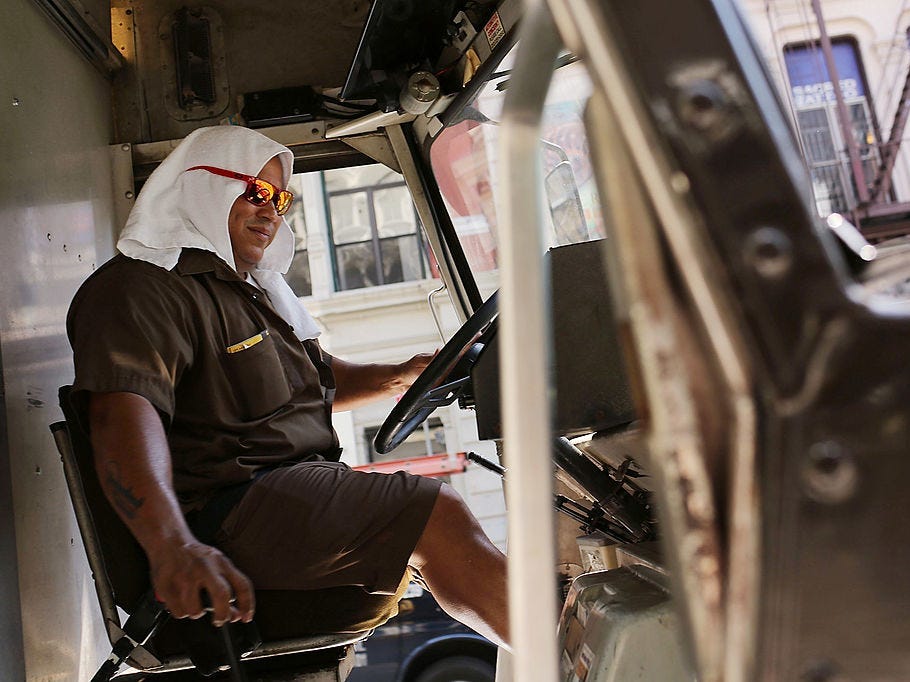- UPS reported slower revenue but solid profits in a Tuesday earnings release.
- Upcoming negotiations with the Teamsters and a possible driver strike make for cautious forecasts.
- A strike could strand millions of deliveries and raise shipping prices.
More than the perplexing economy, more than the future of e-commerce, the questions on the minds of UPS employees, customers, and Wall Street analysts center on the July 31 expiration of the company’s contract with the Teamsters union that represents the company’s 350,000 drivers and package handlers.
The union has been preparing to strike for months, but UPS CEO Carol Tomé has said she wants a contract that’s good for the Teamsters, UPS employees at large, and the company.
“I would submit that a win-win-win is very achievable because we are not far apart on the issues,” Tomé said on the company’s Tuesday earnings call.
And on two key issues, she said, UPS and the Teamsters are more aligned than not.
Weekend warriors
Weekend deliveries have been a point of tension between UPS and the union for years.
At the heart of UPS's Saturday service is the "22.4" driver, named for the section of the contract that created the position. These drivers work Tuesday through Saturday and top out at $30.64, while regular drivers can reach $42. The Teamsters see these drivers as "second class" and now regret that the position was approved in the controversial 2018 contract.
Because the contract restricts how many 22.4s the company can hire, UPS often pays weekday drivers overtime to work Saturdays.
Tomé called weekend delivery service "table stakes."
"We're open to finding a solution to the seven-day week delivery because that's what the competition is doing," Teamsters General President Sean O'Brien told Insider last year, but the existing staffing solution is not working in his view.
"We share the same concerns. I don't want people working six days a week unless they want to," said Tomé, also mentioning 22.4 drivers. "We just need to get to the bargaining table and work it out," she said.
Heat and safety
Tomé also brought up the growing problem of dangerous heat inside delivery vans, which has been at the front of the Teamsters' priority list since a 24-year-old driver died after being found unconscious in his delivery truck in June.
"We're not apart on this issue. In fact, we're not waiting for the bargaining table," Tomé said. "We've already kicked off a total revamp of our safety program, bringing in new technology, hydration, cooling systems, and a whole lot more to address it."
Other issues O'Brien told Insider he would raise when negotiations begin in April include pay raises, especially for part-timers; seasonal workers who deliver packages in their own cars; and driver-facing cameras.
The elephant in the room
UPS stock was up 4% four hours following the Tuesday call in which revenue was down 2.7% year over year and UPS forecasted uncertain times ahead in terms of delivery demand. Revenue per package, however, was up 7.2% and the company announced a 6.6% bump in the dividend it pays out to investors along with $5 billion in shareholder buybacks. Tomé's success protecting profits and investors in ever-changing circumstances could sustain the tension at the negotiating table since the union has argued that UPS demonstratively has the cash to raise wages and more.
"It's not going to be a cost-neutral contract. We're going to take from them what our members deserve," said Teamsters General Secretary-Treasurer Fred Zuckerman earlier this month, according to a statement.
Goldman Sachs analysts wrote in a note on Tuesday that a key question going forward is how much more the company will need to pay in driver wages. A Teamsters spokesperson referred Insider to O'Brien's tweets for comment on UPS earnings.
"UPS Management talks about return on invested capital but UPS #Teamsters are the capital...Time to invest in them & spread the wealth," O'Brien tweeted. "Don't be fooled by their 'cloudy predictions for 2023' ...This company is still going to make a boatload of money. If they want a 'win, win, win' scenario, they need to prove it during negotiations."
On Tuesday, Tomé emphasized that a healthy and growing UPS is good for everyone involved.
